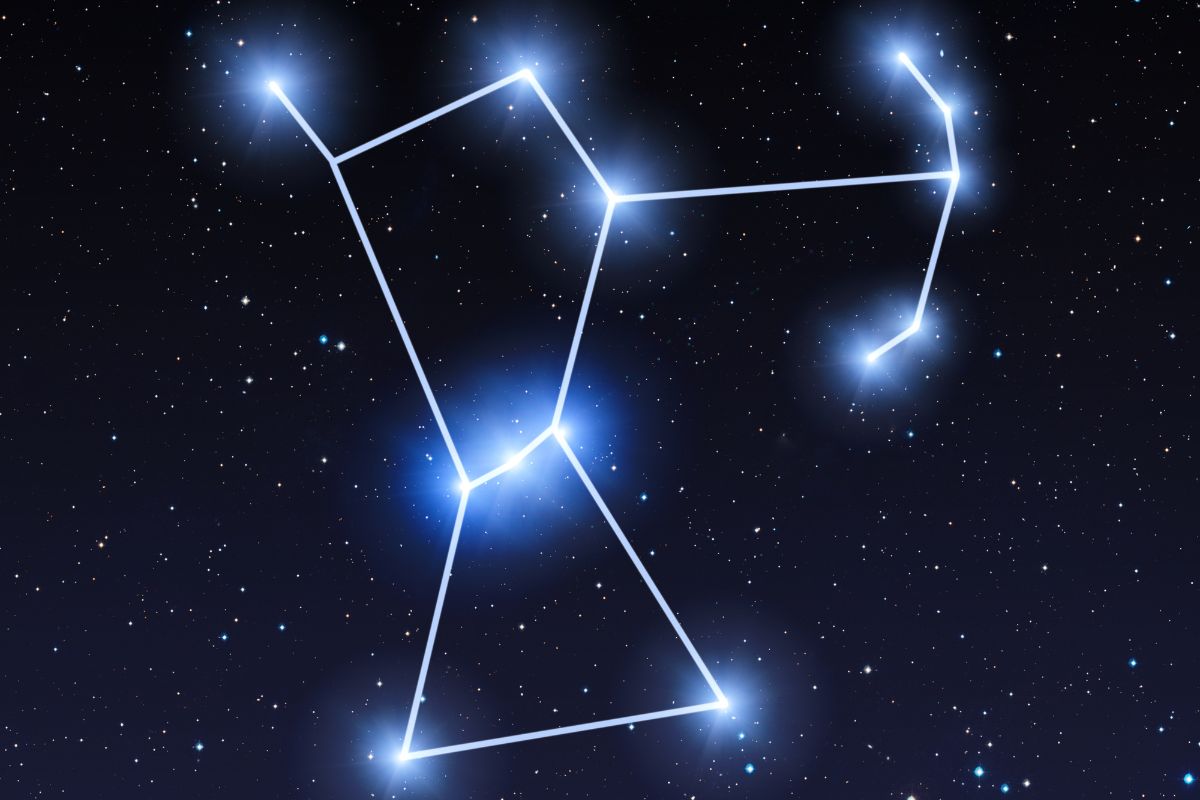Orion Star Odyssey: Unveiling Winter’s Celestial Majestic
Orion star , the iconic constellation, graces the winter sky with its distinctive hourglass shape. Comprised of luminous stars, it boasts Betelgeuse and Rigel as its standout luminaries, marking the hunter’s right shoulder and left foot, respectively. The celebrated “belt of Orion,” consisting of Alnitak, Alnilam, and Mintaka, serves as a recognizable feature across diverse cultures and regions, captivating sky gazers with its stellar brilliance and easily identifiable form.
- Betelgeuse, a red supergiant, is nearing the end of its life cycle and is expected to go supernova, potentially becoming one of the most spectacular astronomical events visible from Earth.
- Rigel, a blue-white supergiant, shines brightly due to its immense luminosity, radiating over 120,000 times more light than the Sun.
- The belt stars, Alnitak, Alnilam, and Mintaka, though appearing close together from our perspective, are at significantly different distances from Earth.
Myths and Legends: A Celestial Tapestry Across Cultures
Orion star mythological significance transcends cultural boundaries, weaving a rich tapestry of cosmic narratives. In ancient Greek mythology, he embodies the archetype of a skilled hunter, often portrayed with a club and shield. His celestial journey intertwines with tales of gods, mortals, and star-crossed lovers, creating an intricate cosmic narrative that resonates through human storytelling across epochs and civilizations.
- Orion star presence extends across multiple cultures. For instance, in ancient Egyptian mythology, Orion was associated with Osiris, the god of the afterlife, and was depicted in various hieroglyphs and ancient texts.
- In Australian Aboriginal mythology, Orion’s prominent stars are linked with Dreamtime stories and serve as significant markers in their cultural astronomy.
Cosmic Insights: Orion’s Hidden Marvels Revealed
Orion, beyond being a visual spectacle, unveils profound cosmic secrets waiting to be discovered. The Orion Nebula, a radiant jewel visible to the naked eye, stands as a celestial nursery where new stars are born amidst swirling gases and dust. Peering through telescopic lenses reveals a breathtaking celestial ballet—a vivid tapestry where the birth and evolution of stars sculpt the nebula’s vibrant hues. Nestled within Orion star lies the Horsehead Nebula, a shadowy silhouette against the backdrop of luminescent gas, showcasing the interplay of cosmic light and darkness in a captivating cosmic landscape.
- The Orion Nebula is a stellar nursery containing over 1,000 young stars and is one of the most studied regions for understanding star formation.
- The Horsehead Nebula, located in the Orion Molecular Cloud Complex, is a dark nebula that appears as a distinct silhouette against the bright background of emission nebula IC 434.
Celestial Neighbors: Exploring Orion’s Cosmic Quorum
The celestial neighborhood around Orion abounds with celestial marvels. Taurus introduces the resplendent Pleiades, a star cluster steeped in myth and astronomical beauty. Canis Major proudly hosts Sirius, the Dog Star, radiating brilliance across the night sky, while Gemini presents Castor and Pollux, celestial twins adding depth and intrigue to the cosmic tableau. These neighboring constellations, coupled with Orion’s grandeur, offer a celestial banquet for enthusiasts, unveiling a myriad of cosmic treasures to explore and admire.
- The Pleiades, also known as the Seven Sisters, is an open star cluster consisting of hot, young blue stars surrounded by a nebulous glow.
- Sirius, the brightest star in the night sky, is a binary star system comprising Sirius A, a bright white star, and Sirius B, a faint white dwarf.
Navigating Orion Star Realm: A Stargazer’s Compendium
For astronomy enthusiasts captivated by Orion’s allure, navigating its cosmic wonders becomes an immersive cosmic endeavor. Escaping urban lights to embrace darkness offers an unobstructed view of the cosmic spectacle. Winter’s embrace provides prime visibility of Orion in the Northern Hemisphere, inviting enthusiasts to explore its celestial splendor. Astronomical tools—star charts, binoculars, or telescopes—serve as gateways, unraveling Orion’s celestial intricacies. Sharing the cosmic spectacle with friends and family fosters shared celestial memories amidst Orion’s enchanting embrace.
- Orion’s visibility in the night sky varies depending on the observer’s location and the time of year. In the Southern Hemisphere, it appears upside-down during the winter months.
- Orion is an excellent starting point for novice astronomers due to its prominent stars and easily recognizable shape, making it an ideal constellation for learning celestial navigation.
Embracing The Cosmic Odyssey: A Celestial Affair
Observing Orion star transcends mere stargazing—it’s an intimate communion with the universe, a journey through time and space that connects us to the grandeur of creation. In the quiet moments under Orion’s watchful gaze, we contemplate our cosmic insignificance, ponder our cosmic origins, and revel in the ongoing cosmic narrative.
Conclusion: The Eternal Invitation
Orion star, the radiant hunter of the winter heavens, embodies more than a mere celestial pattern—it encapsulates an invitation to humanity’s timeless fascination with the cosmos. Its shimmering stars and captivating myths transcend borders, serving as a celestial guide to cosmic wonders. Beyond its stellar brilliance, Orion reveals cosmic treasures—the ethereal glow of the Orion Nebula and the enigmatic allure of the Horsehead Nebula. Its cosmic companions enrich our celestial explorations, unveiling a myriad of cosmic marvels to behold. Navigating Orion’s celestial realm becomes a cosmic odyssey—an immersive experience steeped in darkness, embraced during win











